Chef Reveals Big Mistakes Everyone Makes Cooking On A Cast Iron Griddle
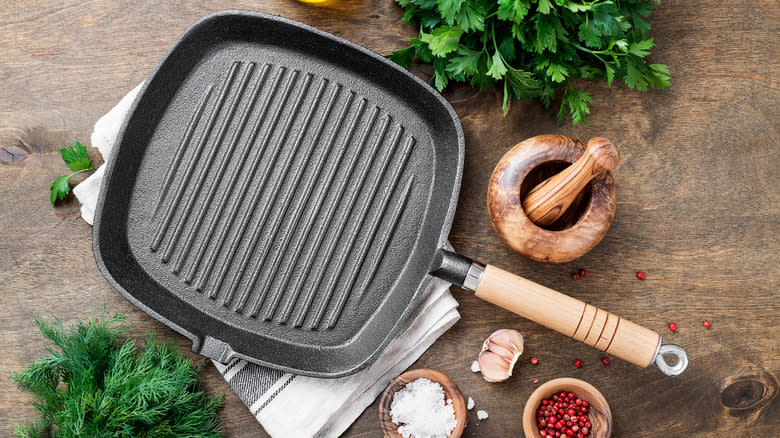
Whether I'm on the clock in a kitchen or cooking at home, I love working with a cast iron griddle. There aren't too many other pieces of cookware with cast iron's unique mix of durability and versatility. Cooking with cast iron makes everything from roasting and baking to frying and steaming possible, granting access to seemingly endless recipes. Whether you're making a batch of perfect southern fried chicken or baking some sweet and buttery cornbread, cast iron is here to save the day.
Despite cast iron's practicality and impressive lifespan (it can be passed down for generations), many people still feel reluctant to incorporate it into their cooking. This may be due to the mistaken perception that cast iron is difficult to maintain. Others may feel comfortable using cast iron, but could be inadvertently causing it damage due to misinformation. The good news is, I've identified a few common mistakes people tend to make with cast iron griddles. Allow me to steer you in the right direction by explaining each one.
Read more: 8 Baking Sheet Mistakes You Want To Avoid
Mistake: Not Seasoning It Properly
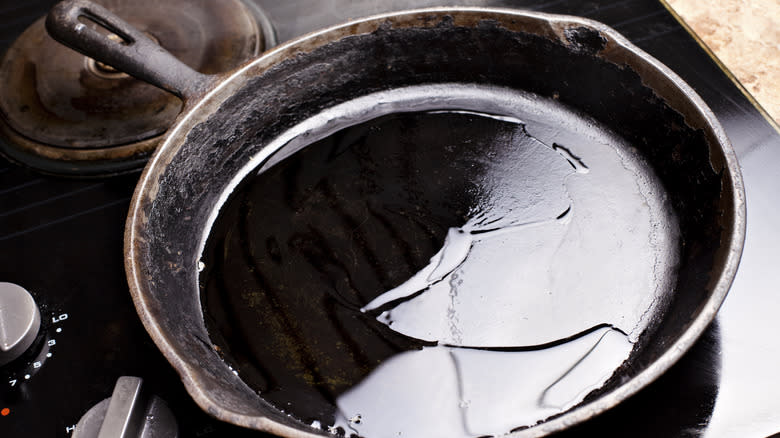
For newcomers, the term "seasoning" in the context of cast iron may feel confusing and ambiguous. For the sake of clarity, let's be clear: When we refer to the act of seasoning cast iron, we aren't talking about sprinkling the metal with dried herbs and spices. In this case, seasoning refers to the process of oiling and heating cast iron so that it's protected from rust. Cast iron cookware should be cleaned and seasoned after every use.
The first step to seasoning is to give the cast iron griddle a light scrub with some warm and soapy water, followed by a thorough drying with a towel. Once the cast iron is dry, put it on the stove for a couple minutes on medium heat to evaporate any moisture. Turn the stove off when the cast iron is warm. Next, rub the entire pan with cooking oil using a paper towel. Avocado oil is a good choice. You don't want to leave a pool of oil sitting inside; you want a thin layer rubbed everywhere, including the sides, bottom, and any handles.
Proceed to heat the pan in the oven at 450 degrees Fahrenheit for half an hour. Take it out of the oven, rub it down with more oil, and bake it again for the same amount of time. If your cast iron is new, then you'll want to repeat this process a few times.
Mistake: Cooking Acidic Foods
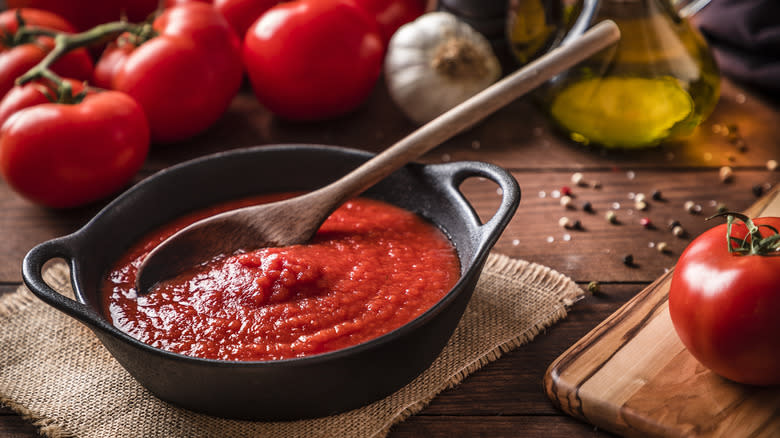
Because cast iron cookware is so versatile, it can be tempting to use it for everything -- but the reality is that there are a few dishes that should be avoided. Acidic creations like tomato sauce are at the top of the list.
The problem here is that when the natural acids in tomatoes come into contact with cast iron, they leach molecules from the metal into the sauce. Because only a trace amount of these molecules are infused into the food, this isn't typically cause for alarm, health-wise. However, these molecules definitely impart a noticeable and unappetizing metallic flavor. This can happen in as little as 30 minutes. I think we can all agree that we don't want our pasta Bolognese to taste like a pocketful of loose change.
The other problem with cooking acidic foods in cast iron is that it can damage the seasoning on the metal. The acids in the tomato sauce cause the oils to deteriorate, gradually removing the slick barrier between your food and the cast iron. This can cause more stickage in the cookware, which we obviously want to avoid. The bottom line is, if you're cooking a tomato-centric dish, cast iron is not the way to go. Use stainless steel cookware instead.
Mistake: Soaking The Cast Iron
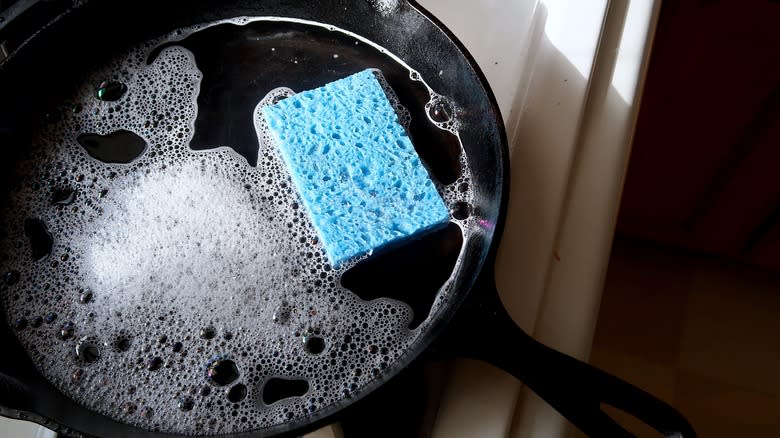
When you're done cooking with your cast iron, there's a good chance that there will be a little food debris stuck to the pan. When this happens with other cookware, people commonly fill the pot or pan up with soapy water and let it soak so that the stuck food can be scrubbed off more easily. While that can work with stainless steel and other dirty dishes, this approach should not be taken with cast iron.
The issue here is that cast iron is naturally porous. In the same way that oils permeate the metal during the seasoning process, water can also seep into the cast iron during a soak, which is something we want to avoid at all costs. As you might imagine, excessive moisture in the metal can lead to rusting. Rather than soaking cast iron for long periods of time the way you might with other cookware, you should clean cast iron quickly with as little water as possible. This will protect the metal from the prolonged water exposure that causes deterioration.
Mistake: Not Preheating It
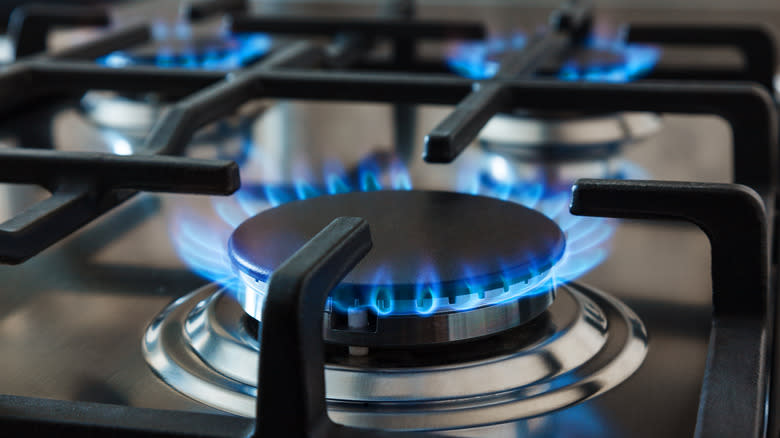
Preheating cast iron is essential and one of the most important steps in properly cooking with it. There are a few different problems with trying to cook in cold cast iron. The main issue is that the food will stick to the bottom of the griddle, leading to a messy-looking dish, along with laborious cleanup.
Unless you're trying to sear something to create a crust, in most cases, you'll want to preheat your seasoned cast iron over medium to medium-high heat for a few minutes. Cast iron retains heat very well, but contrary to popular belief, it actually doesn't heat up very evenly. To help it heat more evenly, it's a good idea to rotate the pan around the burner in different positions every minute or so. Turning the pan like this ensures that the entire surface makes more direct contact with the heat, reducing the chances of intense hot spots that lead to uneven cooking.
Mistake: Using Metal Scouring Pads
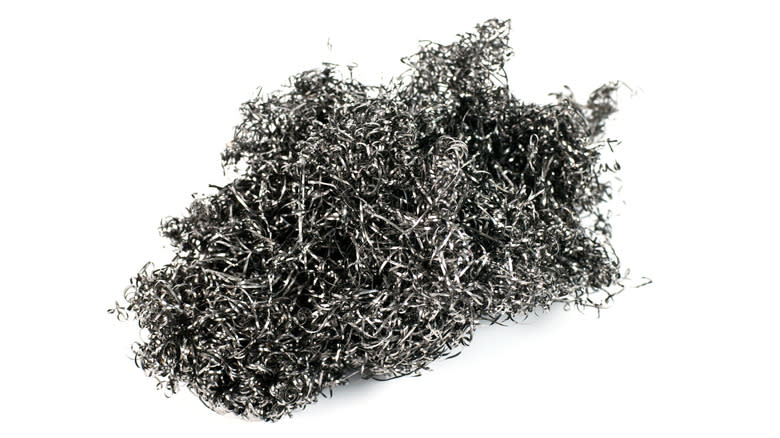
There seems to be a little confusion about the ways cast iron can be damaged. Some say that it's best to avoid using metal utensils on cast iron. This is partly true if it's still new, but for the most part, as long as you don't press down hard and scrape at the pan with force, it should be fine. Cast iron is quite resilient.
The operative word here is force. If you're using serious force with another metal object on the surface of your cast iron cookware, then it can strip away the oily seasoning and leave little gashes in the metal. These little gashes will cause food to stick and also retain water that eventually leads to rusting. For this reason, scrubbing cast iron with metal scouring pads is not a good idea. Instead of using metal sponges, use something a little more gentle. The scrubby side of a sponge or a brush with softer bristles should work fine.
Mistake: Putting It In The Dishwasher
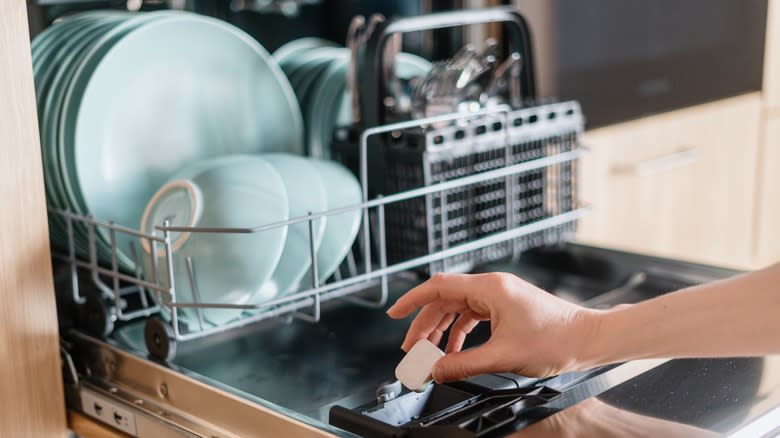
There's no doubt that dishwashers save a lot of time and energy. No one wants to clean dirty dishes by hand if a machine can do it instead, right? Due to this undeniable convenience, many of us get into the habit of loading up our dishwashers with just about everything that normally gets tossed in the sink. We hate to be the bearer of bad news, but the truth is that you should be cleaning your cast iron cookware by hand.
There are a few reasons for this. First and foremost, there's the issue of prolonged exposure to water. Immersing cast iron in a chamber of continuous water pressure isn't exactly the smoothest move to make, since it will surely soak into the metal. Another issue is that high-pressure blasts of soapy water from the dishwasher may strip off the cast iron's seasoning over time. Also, it's not unheard of for dishes to get scraped during the washing cycle if they're not safely positioned. As water sprays around during the cleaning process, it may nudge a metal utensil over that ends up repeatedly clanging into and scraping the pan. You get the gist: This is just a bad idea all-around.
Mistake: Not Cleaning The Cast Iron Fast Enough
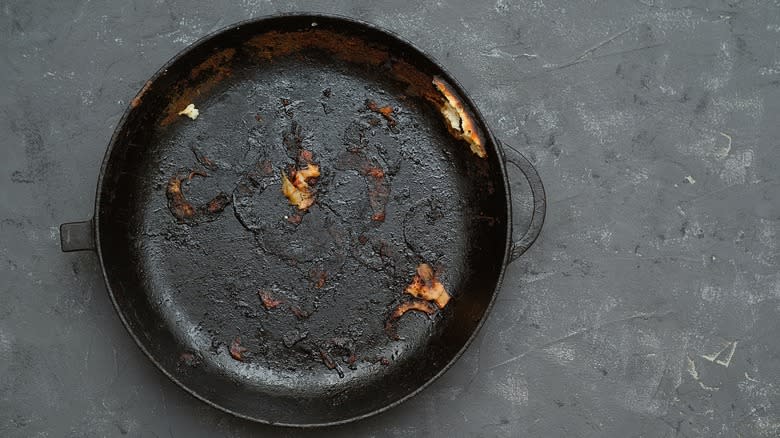
It's always a good idea to clean as you go when you're cooking in a kitchen. Not only is this a good practice for the sake of sanitation, it also makes cleanup more manageable. At the same time, it's easy to get swept up in enjoying the fruits of our labor and eating while we let the dirty cookware sit out for a bit. But when it comes to cast iron, this is definitely a mistake.
Cast iron is much easier to clean shortly after it's been used. Once the metal cools down, all the food debris inside the pan quickly fuses to the surface, making it difficult to clean. While this is true for most cookware, it's a bigger problem for cast iron, because, as we've learned, it really shouldn't be soaked. Instead of waiting to clean your cast iron, try your best to give it a quick scrub and re-seasoning shortly after using it. In the end, this will save you extra work and also prolong the life of your pan.
Mistake: Storing Leftovers Inside Of It
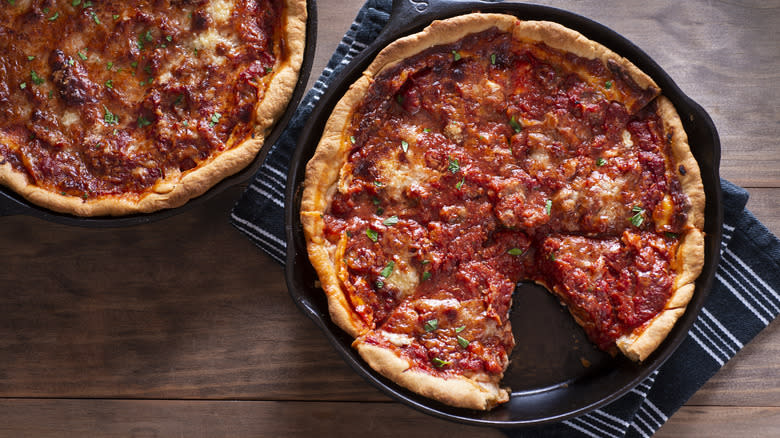
I admit it: I've definitely been known to eat baked macaroni and cheese straight out of the pot, then throw it directly into the fridge. What can I say? Old habits die hard. Still, I've never stored leftovers like this with cast iron because I know that cast iron shouldn't be used like Tupperware.
Once again, this comes down to prolonged contact with moisture. No matter what food it is -- pasta, chili, frozen deep dish pizza -- it retains a good amount of water inside. In fact, around 20% of our daily water intake comes from the food that we eat. So when that moisture is nestled up against the metal of a cast iron pan overnight in the fridge (or possibly even longer) it's slowly seeping to the metal.
Sure, it's definitely easier to just store what you've cooked in the vessel itself. But show your cast iron some love and spare it needless suffering. If you take proper care of it, it will reward you with a lifetime of meals. And if you ask me, that's the ultimate prize.
Read the original article on Daily Meal

